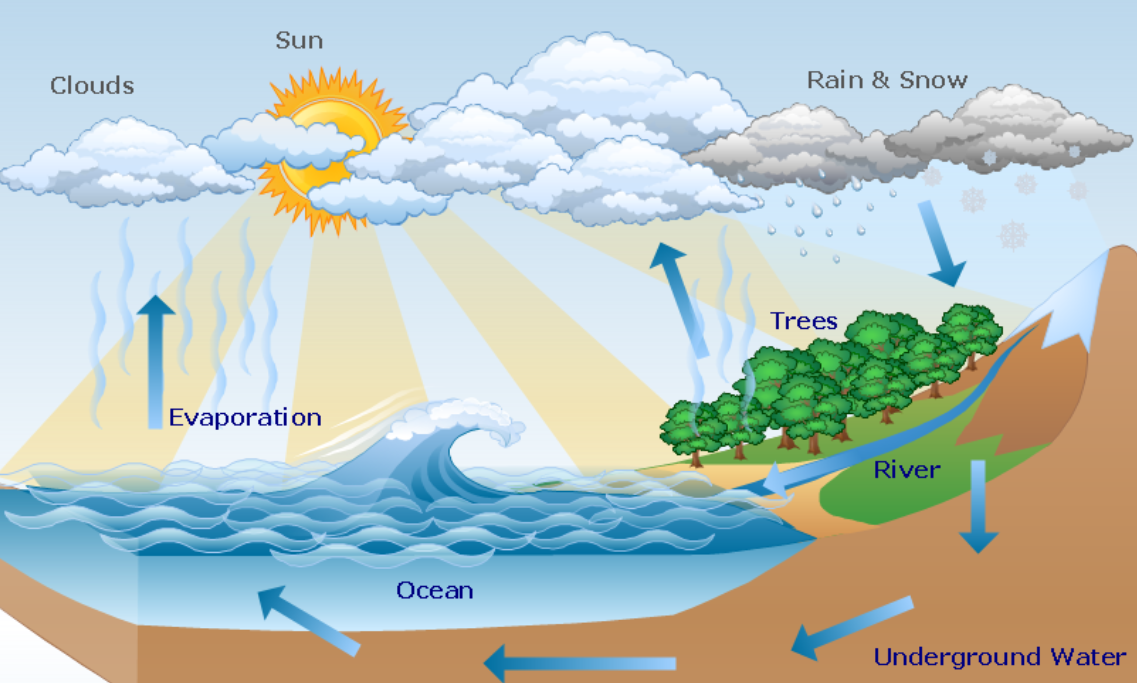
Draw a neat and labeled diagram of water cycle in nature.
Answer
586.2k+ views
Hint: The water cycle is also called as hydrologic cycle, where there is a continuous circulation of water in the earth atmosphere that takes place, where the water cycle is the motion of water from the ground to the atmosphere and back again to the ground.
Complete answer:
The important steps involved in the water cycle are

Evaporation: This is the process of converting the liquid form into a gaseous form, for the conversion to happen, some energy is required, it may be sunlight, or any other energies in the atmosphere, this one of the important steps of the water cycle.
Even one can experience the evaporation in their own body, during exercise, or during dehydration, etc.
Transpiration: It is another important step of water cycle happen in the environment, where planets contain the structure called stomata, present on the surface of the leaves, where enters is expelled in the form of vapour to the atmosphere, it is mainly dependent on atmosphere humidity, out of total water consumed by the only 1% is utilized for growth and remaining is send back to atmosphere.
Condensation: It is opposite to that evaporation, in this step, gaseous form of water, that is water vapour is condensed to water, and in this generally heat is released.
Precipitation: If the condensation water grows and becomes too large, and when they have collision and coalescence, this results in the precipitation, generally precipitation is in the form of rain, hail, eff.
Run off: If the excessive precipitation occurs, it results in run off, because earth also becomes saturated, and the rivers and lakes are mainly responsible for run off, out of this some percent is evaporated, while most of the water goes back to the oceans.
Hence, the correct answer is option (B).
Note: Water cycle involves the exchange of energy, where it is responsible for the temperature changes, when the water evaporates it takes up the energy and cools the environment, and it releases , mainly during condensation, it releases the energy and heats up the climate.
Complete answer:
The important steps involved in the water cycle are

Evaporation: This is the process of converting the liquid form into a gaseous form, for the conversion to happen, some energy is required, it may be sunlight, or any other energies in the atmosphere, this one of the important steps of the water cycle.
Even one can experience the evaporation in their own body, during exercise, or during dehydration, etc.
Transpiration: It is another important step of water cycle happen in the environment, where planets contain the structure called stomata, present on the surface of the leaves, where enters is expelled in the form of vapour to the atmosphere, it is mainly dependent on atmosphere humidity, out of total water consumed by the only 1% is utilized for growth and remaining is send back to atmosphere.
Condensation: It is opposite to that evaporation, in this step, gaseous form of water, that is water vapour is condensed to water, and in this generally heat is released.
Precipitation: If the condensation water grows and becomes too large, and when they have collision and coalescence, this results in the precipitation, generally precipitation is in the form of rain, hail, eff.
Run off: If the excessive precipitation occurs, it results in run off, because earth also becomes saturated, and the rivers and lakes are mainly responsible for run off, out of this some percent is evaporated, while most of the water goes back to the oceans.
Hence, the correct answer is option (B).
Note: Water cycle involves the exchange of energy, where it is responsible for the temperature changes, when the water evaporates it takes up the energy and cools the environment, and it releases , mainly during condensation, it releases the energy and heats up the climate.
Recently Updated Pages
Master Class 11 Computer Science: Engaging Questions & Answers for Success

Master Class 11 Business Studies: Engaging Questions & Answers for Success

Master Class 11 Economics: Engaging Questions & Answers for Success

Master Class 11 English: Engaging Questions & Answers for Success

Master Class 11 Maths: Engaging Questions & Answers for Success

Master Class 11 Biology: Engaging Questions & Answers for Success

Trending doubts
There are 720 permutations of the digits 1 2 3 4 5 class 11 maths CBSE

Discuss the various forms of bacteria class 11 biology CBSE

Draw a diagram of a plant cell and label at least eight class 11 biology CBSE

Explain zero factorial class 11 maths CBSE

What organs are located on the left side of your body class 11 biology CBSE

Draw a diagram of nephron and explain its structur class 11 biology CBSE




